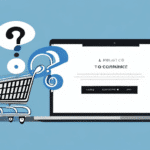Introduction
Are you considering a career as a Director of Ecommerce? It's an excellent time to dive into this dynamic and rapidly evolving industry. In this article, we'll provide an in-depth analysis of what it takes to become a successful Director of Ecommerce, including required qualifications, essential skills, and key job responsibilities. We'll also explore common challenges, emerging trends, and offer tips for building a thriving career in this field. Let's get started!
The Rapid Growth and Significance of Ecommerce
Explosive Market Expansion
Ecommerce continues to experience substantial growth. According to Statista, global ecommerce sales reached approximately $5.7 trillion in 2022 and are projected to surpass $8.1 trillion by 2026. This surge is driven by consumers' increasing preference for online shopping, accelerated by the COVID-19 pandemic's impact on consumer behavior.
The Rise of Mobile Commerce
The proliferation of mobile devices has significantly contributed to ecommerce growth. In 2023, mobile commerce accounts for over 72% of total ecommerce sales, according to eMarketer. Consumers value the convenience of shopping on smartphones and tablets, enabling purchases anytime and anywhere.
Global Reach and Accessibility
Ecommerce provides businesses with the opportunity to reach a global audience. With online platforms, companies can expand their customer base beyond local markets, facilitating international growth. This global accessibility levels the playing field, allowing small businesses and entrepreneurs to compete with larger, established firms on a worldwide scale.
The Director of Ecommerce: Responsibilities and Job Description
Overseeing Ecommerce Operations
As a Director of Ecommerce, you are responsible for managing all aspects of your company's online sales and presence. This includes overseeing web design, content creation, digital marketing, and customer service teams. Your role is pivotal in developing and executing strategies that drive online revenue and enhance the customer experience.
Strategic Planning and Implementation
You will develop and implement comprehensive ecommerce strategies aligned with the company's overall business objectives. This involves setting goals, managing budgets, allocating resources effectively, and tracking key performance indicators (KPIs) to measure success.
Staying Ahead of Industry Trends
Keeping up-to-date with the latest ecommerce trends and technologies is essential. This includes advancements in mobile commerce, social media marketing, artificial intelligence, and online payment systems. Your ability to adapt and integrate new technologies will keep your company competitive in a fast-paced market.
Building and Maintaining Stakeholder Relationships
Building strong relationships with suppliers, vendors, and partners is crucial. You will negotiate contracts, manage partnerships, and ensure collaborative efforts towards common business goals. Effective communication and interpersonal skills are vital in this aspect of the role.
Essential Qualifications and Skills
Educational Background
A bachelor's degree in marketing, business, or a related field is typically required for a Director of Ecommerce position. Many employers prefer candidates with a master's degree or an MBA, showcasing advanced knowledge and leadership capabilities.
Professional Experience
Significant experience in ecommerce is essential. Demonstrated success in managing teams, driving revenue growth, and handling complex projects will set you apart. Experience with digital marketing, web analytics, and customer relationship management (CRM) systems is highly valued.
Technical Proficiency
A deep understanding of digital marketing strategies, search engine optimization (SEO), search engine marketing (SEM), and social media marketing is crucial. Proficiency in ecommerce platforms, data analytics tools, and content management systems (CMS) is also important.
Leadership and Communication
Strong leadership and excellent communication skills are fundamental. You must be able to inspire and guide your team, set clear expectations, and foster a collaborative work environment. Effective communication with stakeholders across various departments is also key to aligning ecommerce strategies with broader business objectives.
Strategic Planning and Performance Metrics
Developing a Strategic Ecommerce Plan
Your strategic plan should align with the company's overall goals and include specific, measurable targets for revenue growth, customer acquisition, and retention. Conducting thorough analyses of customer behavior, competitor activities, and market trends is essential in formulating effective strategies.
Key Performance Indicators (KPIs)
Tracking KPIs is vital for assessing the performance of your ecommerce initiatives. Important metrics include conversion rates, average order value, customer lifetime value, and bounce rates. Monitoring these indicators helps identify areas for improvement and inform data-driven decision-making.
- Conversion Rate: Measures the percentage of visitors who make a purchase.
- Average Order Value (AOV): Calculates the average amount spent per transaction.
- Customer Lifetime Value (CLV): Estimates the total revenue a customer generates over their lifetime.
- Bounce Rate: Indicates the percentage of visitors who leave the site after viewing only one page.
- Cart Abandonment Rate: Tracks the percentage of shoppers who add items to their cart but do not complete the purchase.
By regularly monitoring these KPIs, you can optimize marketing campaigns, enhance user experience, and increase overall sales performance.
Building and Leading Your Ecommerce Team
Effective Leadership Practices
As a Director of Ecommerce, leading a diverse team of professionals is a core responsibility. This includes setting clear goals, providing constructive feedback, and fostering a culture of continuous improvement. Encouraging collaboration and innovation within the team will drive successful ecommerce initiatives.
Talent Development and Management
Investing in your team's professional development is crucial. Offering training opportunities, mentoring, and career advancement paths will enhance team performance and retention. Recognizing and leveraging each team member's strengths contributes to a more effective and motivated workforce.
Cross-Departmental Collaboration
Working closely with other departments such as IT, finance, and customer service ensures that ecommerce strategies are integrated seamlessly across the organization. Effective collaboration helps in aligning resources, addressing challenges, and achieving unified business objectives.
Overcoming Challenges and Embracing Emerging Trends
Common Challenges
Directors of Ecommerce often encounter challenges such as managing tight budgets, navigating complex technical issues, and keeping up with rapidly changing consumer preferences. To overcome these obstacles, it's essential to be resourceful, adaptable, and proactive in seeking solutions.
Embracing Emerging Technologies
Staying ahead in the ecommerce industry requires embracing new technologies. Innovations like artificial intelligence (AI), machine learning, and augmented reality (AR) are transforming the shopping experience. Integrating these technologies can enhance personalization, improve customer engagement, and streamline operations.
For example, AI-driven chatbots can provide instant customer support, while AR can offer virtual try-ons, enhancing the overall user experience.
Adapting to Market Trends
Understanding and adapting to market trends is crucial for sustained success. Trends such as sustainable ecommerce, social commerce, and the use of influencers are shaping the future of online retail. Keeping abreast of these trends allows you to implement strategies that resonate with contemporary consumer expectations.
According to Forbes, integrating sustainability into ecommerce practices can attract environmentally conscious consumers and differentiate your brand in a competitive market.
Tips for Building a Successful Career as a Director of Ecommerce
- Continuous Learning: Stay updated with the latest industry developments, technologies, and best practices through courses, certifications, and professional development opportunities.
- Networking: Build a robust professional network by attending industry conferences, participating in webinars, and engaging with ecommerce communities online.
- Mentorship: Seek mentorship from experienced professionals in the field to gain insights, guidance, and support in your career progression.
- Emotional Intelligence: Develop strong emotional intelligence to effectively manage teams, handle conflicts, and foster a positive work environment.
- Strategic Thinking: Cultivate the ability to think strategically and make data-driven decisions that align with your company's long-term objectives.
- Adaptability: Be flexible and open to change, as the ecommerce landscape is constantly evolving with new technologies and consumer behaviors.
Conclusion
Becoming a Director of Ecommerce requires a blend of technical expertise, leadership skills, and strategic acumen. Success in this role involves extensive experience in the ecommerce industry, a proven track record in managing teams and driving revenue growth, and proficiency in digital marketing, web design, and content creation. Additionally, staying adaptable, proactive, and committed to continuous learning is essential to keep pace with emerging trends and technologies. By mastering these skills and embracing the dynamic nature of ecommerce, you can build a rewarding and impactful career in this thriving industry.








